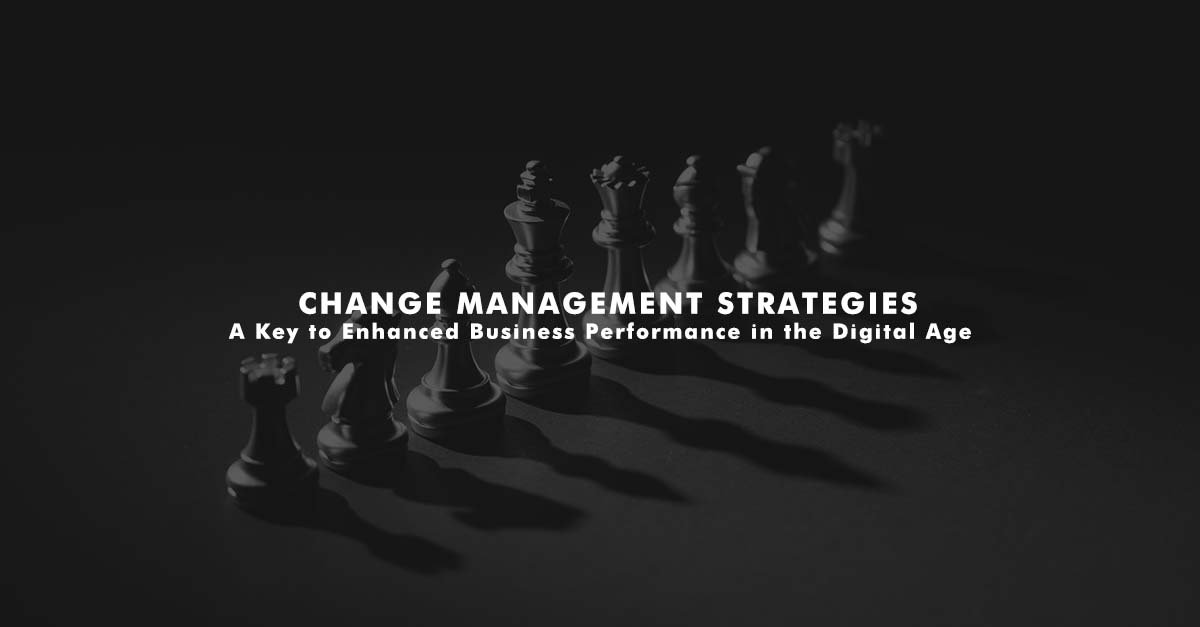
Change Management Strategies: A Key to Enhanced Business Performance in the Digital Age
“Due to the digital disruption, organizations are implementing Change Management strategies more than ever to remain competitive in the business. However, the key to effective change management is not only about transforming the business practices; but also about leveraging on the role of people to attain desired business goals”.
Came COVID-19 pandemic, and the uncertainties prevailed all over. The business practices are undergoing transition, implementing digital tools and observing digital transformation.
Digital transformation is a tool in the business processes and a collective, integrated feature of change management to achieve desired business goals.
Change management has become more critical these days due to the sudden emergence of the pandemic. The digital transition is making the organizations adapt to unprecedented change to cope with the crisis; and also survive in the longer run efficiently.
While the changes are new and unpredictable, they can also adversely influence the business if not managed properly. However, considering this scenario, organizations focus on Change Management practices that apply a collective pragmatic approach coupled with digital tools and procedures to make business more adaptable and resilient to the change.
In this new Industry 4.0, also referred to as the Industrial Revolution 4.0 or Digital Revolution; digital practices have become imperative for organizations to remain business competent.
Unlike the traditional change management processes, the organizations are adapting to those practices; which are more employee-centric and enable a seamless, interactive, and engaging virtual experience while maintaining a positive momentum around the change.
Digital Disruption – The Key to Change Management:
Imagining a Change without embedding a change management practice that comprises digital tools is impossible in this new normal.
While businesses have adopted digital practices, digital tools, too, have resulted in business transformation. While change management varies from business to business; their core objectives remain common to embed the digital tools and achieve defined goals and objectives effectively.
The sudden change in the market trends, shifts in consumer behavior; and the evolution of new market opportunities result in the rising demand for change management practices.
According to a recent survey conducted on C-level executives on organizations across various industries, 51% of the respondents reveal that organizational culture is a barrier to implementing change management practices. Furthermore, 26% of respondents report limited viewpoints as a significant barrier to change management practices, resulting in the sluggish adoption of business practices.
Key Component of Change Management:
While businesses these days are all about the enhanced digital business tools, it is also about implementing the change and embedding the digital tools to achieve desired business goals.
The key components of change management focus on Analyzing, Preparing, and Executing the business strategies while enhancing the competence among the organizations by leveraging upon required expertise to support the change.
Additionally, the change management services provide a professional and objective approach to adapting to the inevitable change by implementing a framework with standards to enable the business to cope with existing and upcoming potential changes.
Achieving Effective Change Management Strategies:
It won’t be hyperbole to say that organizations are still facing challenges in implementing effective change management practices.
The reasons for this obstacle vary from understanding the customers to leveraging digital tools and practices. Implementing digital-based change management strategies is not as easy as it looks.
However, managing the introduction of new technologies, people management, and risk mitigation strategies results in an overall effective change management plan that enables the modern digital business landscape among the business practices.
People are the Key:
Like other transition processes, change management is achievable with the robust participation of the people, the workforce, and stakeholders.
People are the key, they say.
Whether it’s the emerging technology to communicate among the various departments or the tools to carry out skilled design work; having the right people is the key to achieving desired business goals and objectives.
Competitive Advantage through processes:
Organizations are known for what they do the best; and in the age of digital transformation, the effective implementation of digital tools leads to an effective change management plan.
New technology needs new solutions, and hence the traditional business practices are ineffective in gaining competitive Advantage without revolutionizing the business practices.
Gaining a competitive advantage in the market through cost reduction, optimized business processes; and increased quality of service results in an effective change management strategy among the organizations.
Training and Development Initiatives:
One recently conducted research study suggests that 70% of the change management initiatives fail due to a lack of expertise.
Employees try to embed the new innovative set of practices with old traditional business processes, which undoubtedly leads to failure in the entire business process.
Hence, it becomes imperative to conduct training and development programs for the employees to keep them abreast with emerging technologies and feel recognized and supported, empowering them to help change initiatives.
Conclusion:
Change management is the utmost need of the hour for the business to remain competitive among their competitors in the market.
Achieving enhanced business practices by leveraging the digital tools, people participation; and embedding effective change management strategies and plans lead to advanced emerging technologies solutions.





